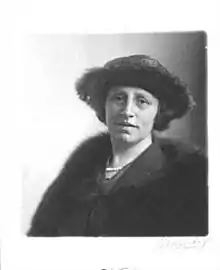Betsy Bakker-Nort
Bertha "Betsy" Bakker-Nort (Groningen, 8 May 1874 – Utrecht, 23 May 1946) was a Dutch feminist, lawyer, and politician.[1] In 1895, Nort became involved with the feminist movement, and set up a department of the Vereeniging voor Vrouwenkiesrecht (VvVK) in Groningen, partly inspired by the experiences she had had in Scandinavia.[2] Thanks in part to her efforts, women's suffrage was introduced in 1919.[3]
Betsy Bakker-Nort | |
|---|---|
 Betsy Bakker-Nort in 1922 | |
| Member of the House of Representatives | |
| In office 1922–1942 | |
| Personal details | |
| Born | Betsy Bakker 8 May 1874 Groningen, the Netherlands |
| Died | 23 May 1946 (aged 72) Utrecht, the Netherlands |
| Political party | |
Bakker-Nort was a lawyer and procureur in Groningen from 1914 to 1930. In The Hague she served in the same capacity from 1930 onwards.[2] She was a member of the House of Representatives for the Free-thinking Democratic League from 25 July 1922 to 6 January 1942.[2]
During World War II she was interned at Westerbork transit camp and Barneveld between December 1942 and 4 September 1944 when she was moved to the Theresienstadt Ghetto. She was liberated in May 1945.[2] Corry Tendeloo took over her seat in parliament in 1946.[4]
Early life and activism
Betsy Nort was born on 8 May 1874 in Groningen, the Netherlands. Her father, a merchant, died when she was five and she grew up mostly around Jewish women. After finishing her secondary school she travelled to Sweden to study Scandinavian languages. She translated Danish, Norse and Swedish works into Dutch. Aged 20 she joined the Dutch women's suffrage association Vereeniging voor Vrouwenkiesrecht, and started its local Groningen chapter.[2][5] In 1904 she married Gerrit Bakker, a grain merchant, and changed her name to Bakker-Nort. They did not have any children.[2][5]
At age 34, Bakker-Nort started reading law, after having toured the country with Aletta Jacobs to convince women of their right to vote. In 1912 she finished her studies and two years later she earned a doctorate for her thesis on the legal position of women across Europe.[5] She then worked as a lawyer in Groningen.[2]
Political career
Bakker-Nort was elected member of the House of Representatives for the Free-thinking Democratic League in July 1922.[2] She mainly addressed parliament on the issues of justice, education and labour.[5]
In 1931 she introduced a bill to remove any requirements for women to be appointed notary, but it failed to be voted through.[2][5] Her so-called "sister pension" bill also did not gain traction.[5]
During election campaigns she urged people to vote for a woman.[5]
In May 1940, just days before the Germans invaded the Netherlands, she announced she would not stand again in the next elections, leaving it to the next generation. Party members suggested Corry Tendeloo would be a good candidate.[6] In 1942 she resigned.[2]
Death and legacy
Despite having renounced her Jewishness, the Germans interned Bakker-Nort at Westerbork transit camp and Barneveld between December 1942 and 4 September 1944. She was then moved to the concentration camp Theresienstadt Ghetto, from which she was liberated in May 1945.[2][5]
References
- "Nort, Bertha (1874-1946)".
- "Mr. B. (Betsy) Bakker-Nort". Parlement.com. Archived from the original on 25 August 2019.
- Gallagher Clarke 1924.
- "Mr. N.S.C. (Corry) Tendeloo". Parlement.com (in Dutch). Archived from the original on 18 April 2021. Retrieved 25 September 2021.
- Meijer 2019, p. 165.
- "Mevr. B. Bakker-Nort" [Ms B. Bakker-Nort]. De Sumatra post (in Dutch). 4 May 1940. Retrieved 4 May 2022.
Sources
- Gallagher Clarke, Ida Clyde (1924). Women of Today. Women of today Press.
- Meijer, Daan D.R. (2019). "Hoofdlijnen voor een moderne huwelijkswetgeving – 1920 Bertha (Betsy) Bakker-Nort (1874-1946) et al" [Main themes for a modern marriage law – 1920 Bertha (Betsy) Bakker-Nort (1874-1946) et al.]. Pro Memorie (in Dutch). 21 (2): 165–168. doi:10.5117/PM2019.2.036.MEIJ.